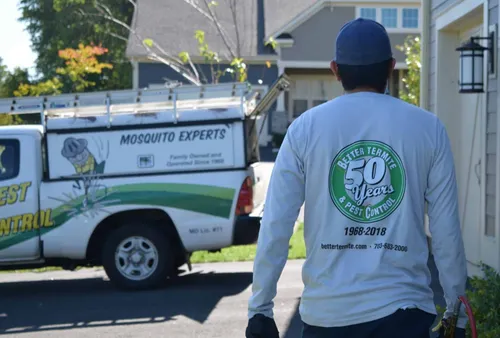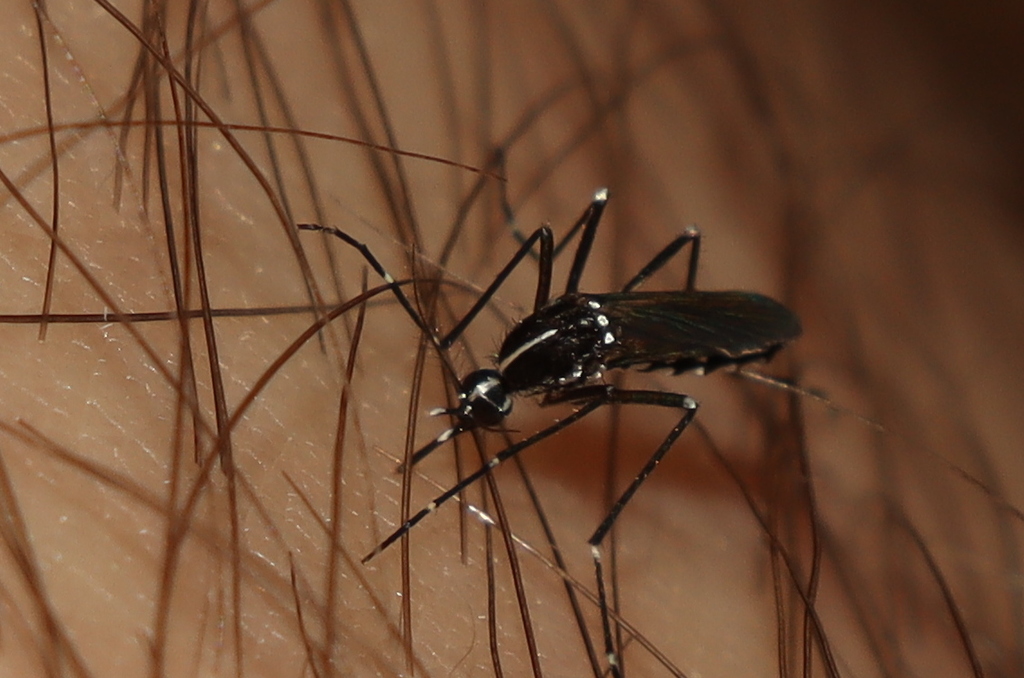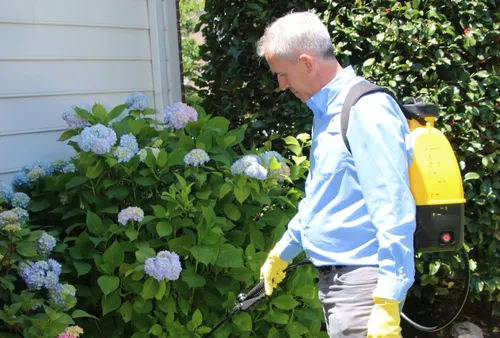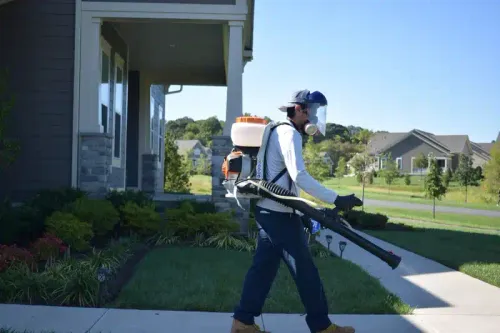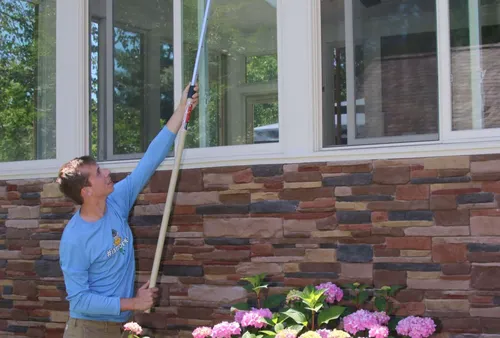Northern Virginia Mosquito Control
7 monthly treatments from April through October. 57 years protecting DC Metro homes with lower-risk products, unlimited free callbacks, and no binding contracts.
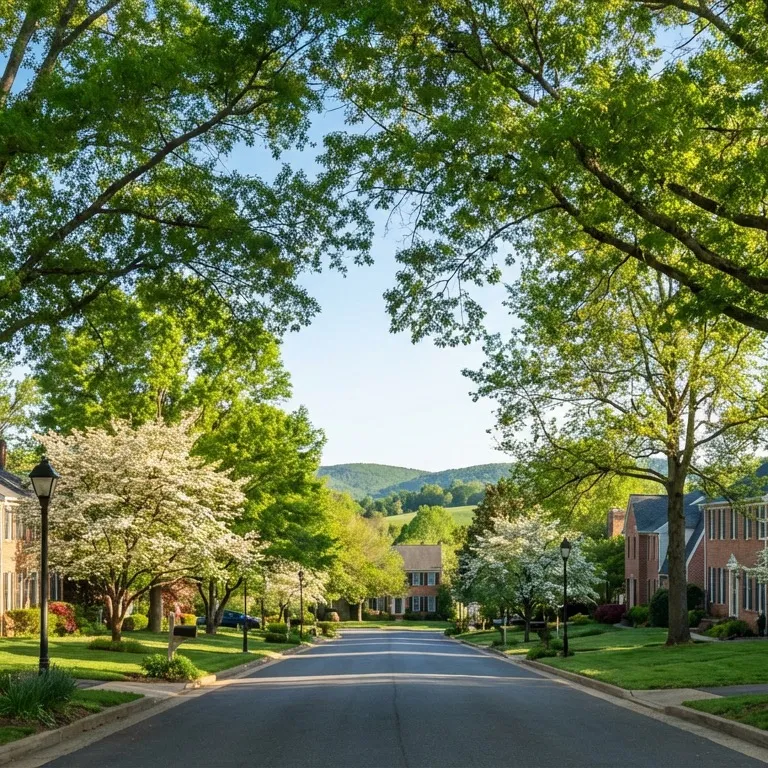





Family Owned
57 years of experience serving local homes with pets and kids.
Lower Risk Products
Our research team picked materials better for the planet & your home
No Contracts
We don't lock you in with paperwork. Stay because it works.
Rivers, Wetlands, and 40+ Inches of Rain: Why Northern Virginia Has a Mosquito Problem
Northern Virginia sits along the Potomac River, surrounded by dozens of creek systems and thousands of acres of wetlands. Dyke Marsh south of Old Town Alexandria. Huntley Meadows in Fairfax County. The Occoquan Reservoir on the Prince William border. Standing water is everywhere. The region gets 40+ inches of rain per year. Summer humidity stays above 70%. Highs reach 88 degrees for weeks. That adds up to a mosquito season that runs hard from April through October.
Better Termite & Pest Control has been protecting homes across Northern Virginia since 1968. That's 57 years and three generations of the Schulz family. Our mosquito program pairs monthly barrier sprays with insect growth regulators that stop the breeding cycle before populations spiral out of control. Every plan includes unlimited free callbacks between visits.
Our internal research team removed 9 of the harshest chemicals common in the pest control industry and replaced them with lower-risk alternatives like Essentria and EcoVia. These are products we use in our own backyards. No binding contracts. Cancel anytime with 30 days notice. Call 703-683-2000 and talk directly with a licensed technician.
Get a Free Quote
Choose the option that works best for you
Option 1: Call a Licensed Tech
Option 2: Submit Your Info to our Team
How Our 7-Month Barrier Program Protects Northern Virginia Yards
Every mosquito program begins with a 78-point property inspection. Your licensed technician walks the full lot, mapping standing water sources, drainage patterns, shaded resting zones, and vegetation near creek corridors. A riverfront home in McLean needs a different strategy than a townhome in Reston or a new-build in Ashburn. Our inspection captures those details.
From April through October, we visit monthly with a backpack mist blower. We apply a targeted spray paired with an insect growth regulator (IGR). The spray kills active mosquitoes on contact. The IGR stops larvae from developing into biting adults, breaking the breeding cycle before populations build on your property.
We concentrate on shaded foliage, hedges, the underside of decks and porches, eaves, and vegetation near standing water. We skip blooming plants and vegetable gardens. After every visit, you get a detailed "Know We Did" email report listing what was applied and where.
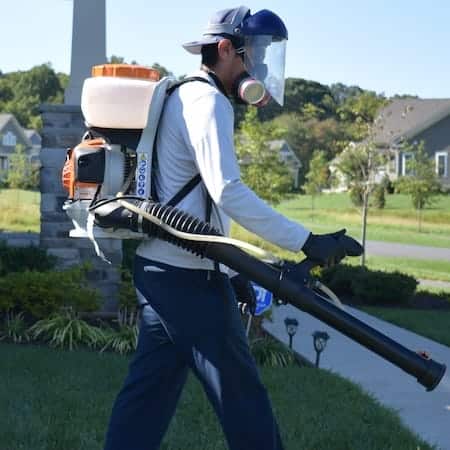
The Asian Tiger Mosquito: Northern Virginia's Most Aggressive Daytime Biter
The Asian tiger mosquito dominates Northern Virginia during daylight hours. You can spot it by its jet-black body and bold white-striped legs. This species doesn't wait until dusk. It will chase you from the patio to the front door in broad daylight. It breeds in tiny amounts of standing water: clogged gutters, birdbath rims, plant saucers, and forgotten buckets tucked behind mature landscaping in neighborhoods from Arlington's Clarendon to Fairfax Station, Burke Centre, and Centreville.
After sunset, the common house mosquito takes over. This species breeds in larger water sources: storm drains, HOA retention ponds, and the sluggish edges of stream corridors like Accotink Creek, Four Mile Run, and the Occoquan River. Homes near Lake Accotink in Springfield, Huntley Meadows in Hybla Valley, and the Potomac River bluffs in Great Falls and McLean deal with heavy dusk and nighttime activity.
Floodwater mosquitoes emerge in huge numbers after heavy rains, which happen regularly in Northern Virginia's humid subtropical climate. Our treatment program addresses all three groups. The barrier spray eliminates adults wherever they rest. The insect growth regulator disrupts eggs and larvae. Together, they attack the lifecycle at every stage.
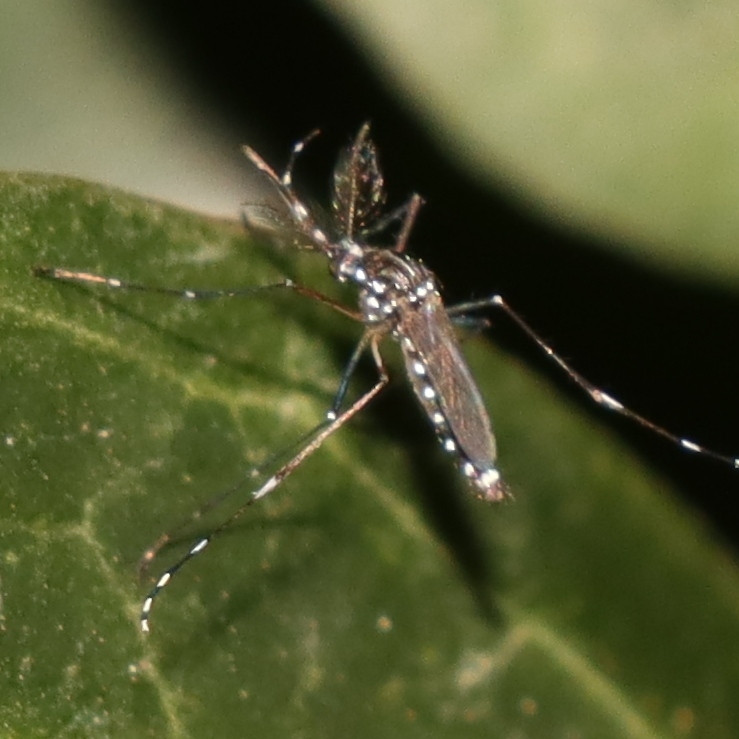
In2Care Stations: No-Spray Mosquito Control for Northern Virginia Properties
If you want mosquito reduction without traditional spraying, our In2Care program uses small stations placed around your yard instead of barrier treatments. Each station holds treated gauze with a larvicide and a fungus that targets mosquitoes at the source.
Female mosquitoes enter the stations looking for a place to lay eggs. They contact the treated materials and then carry them to natural breeding sites across your yard and neighboring properties. This autodissemination effect means a single station creates expanding zones of control well beyond where it sits. It's especially effective near the creek corridors, wetlands, and stormwater basins found throughout Reston, Herndon, Loudoun County subdivisions, and the Mount Vernon corridor.
Our technicians install and maintain In2Care stations monthly from April through October. The system works continuously between visits. Many Northern Virginia homeowners combine In2Care with our barrier spray for maximum protection, though it also works as a standalone option for properties near ornamental gardens or sensitive water features.
How Autodissemination Multiplies Your Coverage
Treated mosquitoes don't stay near the station. They visit multiple breeding sites across several neighboring properties, spreading the larvicide and fungus at each one. A single station can reach breeding areas across adjacent lots. For properties surrounded by creek corridors, HOA ponds, or golf-course water features, this reach makes a real difference.
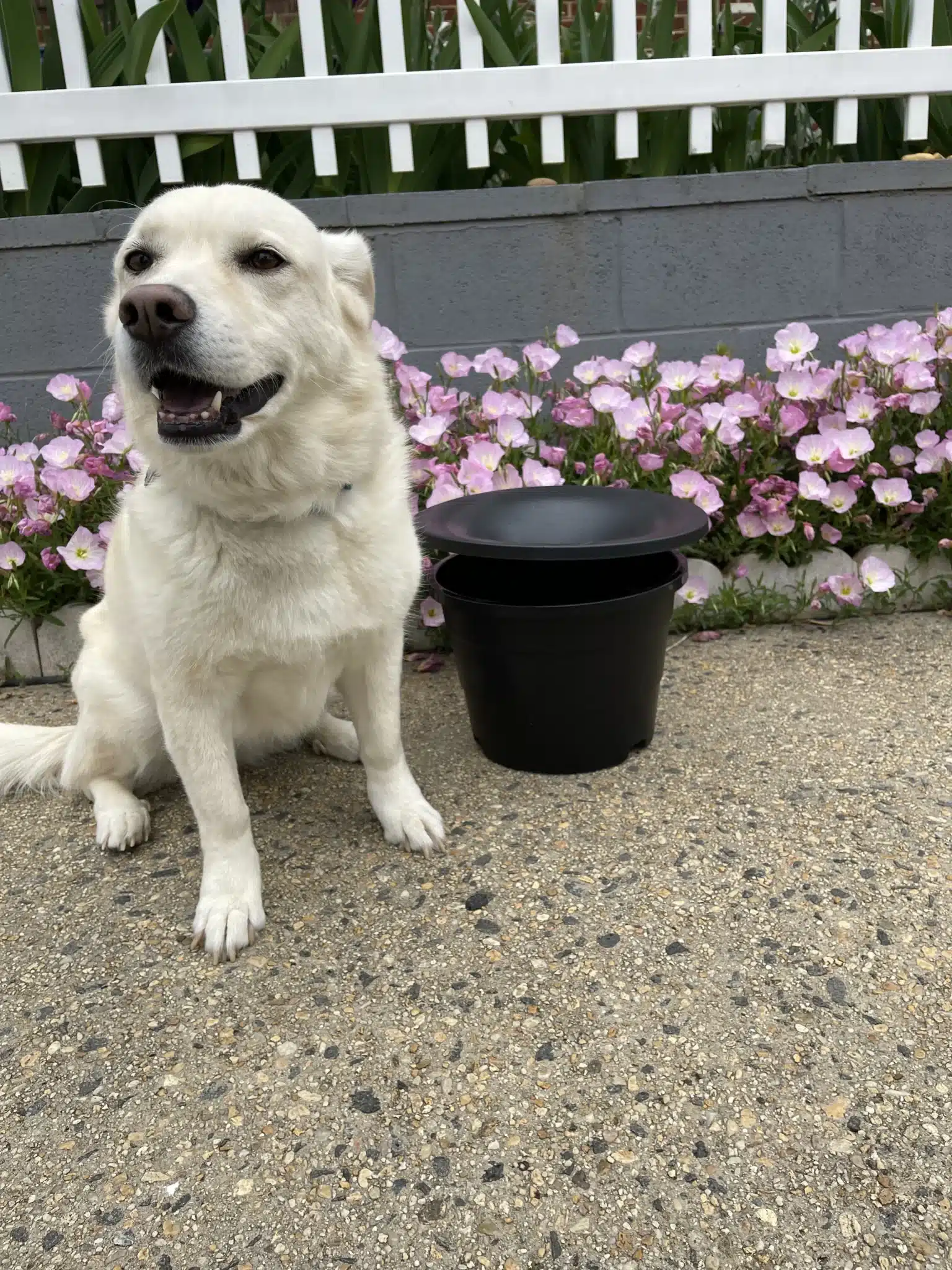
Northern Virginia's Waterways, Parks, and Mosquito Breeding Zones
Northern Virginia covers a broad swath of suburbs from Arlington and Alexandria along the Potomac westward through Fairfax, Loudoun, and Prince William counties. The region is threaded with rivers, wetlands, and protected green spaces that sit right next to dense residential neighborhoods. That combination is ideal for mosquitoes.
The Potomac River forms the eastern boundary. Dyke Marsh is a 485-acre tidal wetland south of Old Town Alexandria. The Occoquan Reservoir covers 2,100 acres on the Fairfax-Prince William border. Lake Accotink in Springfield sits along a 25-mile creek system. Four Mile Run threads through Arlington and Alexandria. Every one of these waterways feeds mosquito populations that push into nearby neighborhoods.
Large parks add to the pressure. Great Falls Park covers 800 acres of forest along the Potomac gorge. Huntley Meadows Park in Hybla Valley spans 1,452 acres of wetlands and woods. Mason Neck State Park and the nearby Elizabeth Hartwell National Wildlife Refuge add over 4,000 acres of marshland near Lorton. These parks support deer, foxes, and raccoons, which carry ticks right into neighboring yards.
The climate drives everything. Northern Virginia averages 40 to 43 inches of rainfall per year. Summer highs hit 88 to 89 degrees. Humidity stays above 70% for weeks at a time. That keeps mosquitoes breeding for 6 to 7 months. Heavy rain events fill every gutter, tarp, and low spot with standing water. Properties near Reston's lakes, Burke's stream valleys, Centreville's stormwater ponds, and Ashburn's HOA retention basins see some of the heaviest mosquito pressure in the DC Metro area.
Tick Protection for Northern Virginia Homes Near Parks and Trails
Ticks are a growing concern across Northern Virginia. Deer ticks carrying Lyme disease have been documented near Great Falls Park, along the W&OD Trail, throughout Huntley Meadows, at Mason Neck, and in the wooded buffers bordering subdivisions from Reston to Woodbridge. Our LawnShield program bundles mosquito and tick control into a single monthly plan. You get one bill, one schedule, and a lower cost than booking separate services.
Tick treatments start in March with granular applications that target the spring nymph surge. That's when young ticks come out of winter dormancy and quest for hosts along brush lines and the transition zone where your lawn meets the tree line. Monthly sprays from April through October focus on these high-risk areas. A November retreatment knocks down overwintering populations before the next season.
We also place Damminix Tick Tubes filled with permethrin-treated cotton. Mice pick up the cotton for their nests. The treatment then kills the ticks that feed on those mice, breaking a key part of the tick lifecycle. This works well along the wooded edges around parks, stream corridors, and the many trail systems that wind through Northern Virginia neighborhoods.
LawnShield: One Plan for Mosquitoes and Ticks
Our LawnShield program covers both mosquitoes and ticks with 9 strategically timed treatments from March through November. Starting at $95 per month, it includes automatic scheduling, one consolidated bill, and unlimited free callbacks between visits. It's the simplest way to protect your Northern Virginia yard through the entire outdoor season.
Note: This is not medical advice. If you suspect a tick bite or are concerned about tick-borne illness, consult your doctor.
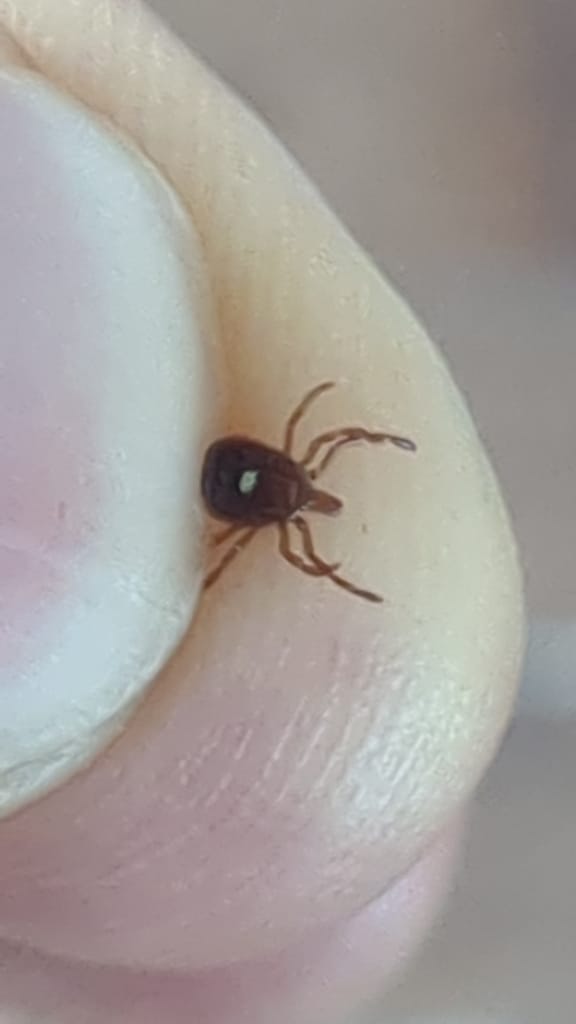
From Phone Call to First Treatment: What to Expect
Step 1: Talk to a Real Person. Call 703-683-2000 and you'll speak directly with a licensed technician. No phone tree, no overseas call center. They'll discuss your property, recommend the right program, and give you a quote during that same conversation.
Step 2: 78-Point Property Inspection. Your technician arrives and walks the full property. They check drainage patterns, standing water sources, shaded resting areas, and vegetation near creek corridors. A historic brick colonial in Old Town Alexandria needs a different plan than a newer subdivision home in South Riding or a large lot backing up to Great Falls Park. Our inspection accounts for those details.
Step 3: Initial Treatment. Using products vetted by our research team, we apply a targeted barrier treatment to shaded foliage, hedges, eaves, deck undersides, and vegetation near water. Most homeowners notice a significant reduction in mosquito activity within 24 to 48 hours.
Step 4: Monthly Protection Through October. Visits run April through October, keeping barrier coverage consistent through peak mosquito season. Between visits, our unlimited callback policy means we come back at no extra cost if you spot a problem. After each service, you'll receive a "Know We Did" email report detailing what was applied and where.
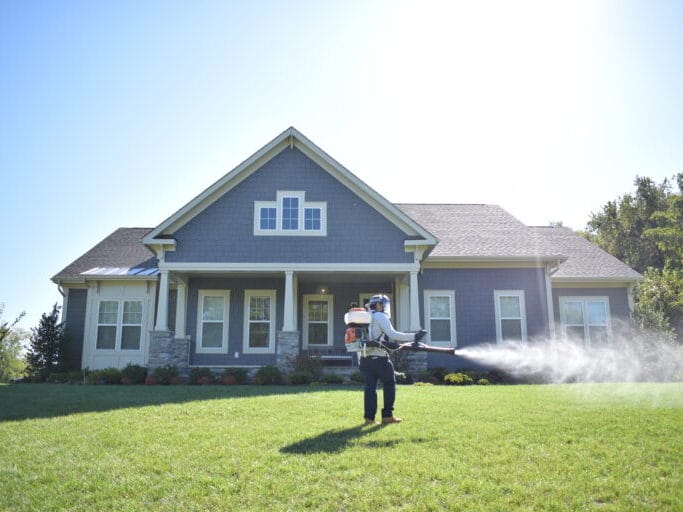
What Your Northern Virginia Neighbors Are Saying
"I love Darren over at Better Termite. He is always so attentive and kind, and really goes, IMO, out of his way to do a fantastic job. And I am so happy that I had NO MOSQUITOES this summer in my backyard in spite of the fact that there is a drainage area right behind my house, and that is 100% because of Better Termites services."
"We've had a subscription service with this company for yrs, since moving into our current house, and realizing it was rather...spidery. But NO MORE! We are now creepy crawly-free! Over the years, they've also tackled ants, bees, and HORRIBLE paper wasps!"
"We've been a customer of Better Termite and Pest Control since moving into our Reston townhouse over 40 years ago and only stopped service because we finally moved out of the neighborhood. They have always provided great service."
"Better Termite has been keeping our house bug free for years with regular perimeter treatments. As a small, family owned business, they are able to personalize their approach based on your needs. It's clear that they prioritize customer service and communication."
"Following a review of their informative website, I called and spoke with Hussam—and he's awesome! He listened patiently to my issues and thoughtfully suggested services that fit my particular needs. Hussam also made it a point to pair me with a technician whose expertise aligns with the issues I am facing."
"I love Darren over at Better Termite. He is always so attentive and kind, and really goes, IMO, out of his way to do a fantastic job. And I am so happy that I had NO MOSQUITOES this summer in my backyard in spite of the fact that there is a drainage area right behind my house, and that is 100% because of Better Termites services."
"We've had a subscription service with this company for yrs, since moving into our current house, and realizing it was rather...spidery. But NO MORE! We are now creepy crawly-free! Over the years, they've also tackled ants, bees, and HORRIBLE paper wasps!"
"We've been a customer of Better Termite and Pest Control since moving into our Reston townhouse over 40 years ago and only stopped service because we finally moved out of the neighborhood. They have always provided great service."
"Better Termite has been keeping our house bug free for years with regular perimeter treatments. As a small, family owned business, they are able to personalize their approach based on your needs. It's clear that they prioritize customer service and communication."
"Following a review of their informative website, I called and spoke with Hussam—and he's awesome! He listened patiently to my issues and thoughtfully suggested services that fit my particular needs. Hussam also made it a point to pair me with a technician whose expertise aligns with the issues I am facing."
Serving All of Northern Virginia
From Arlington to Ashburn, Alexandria to Woodbridge. We've been protecting DC Metro homes since 1968.
